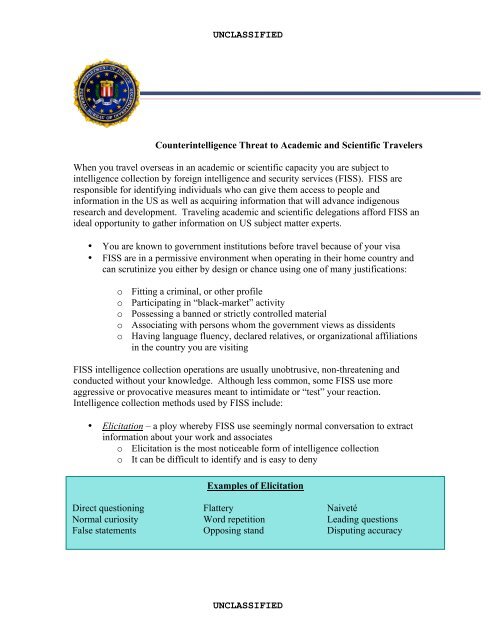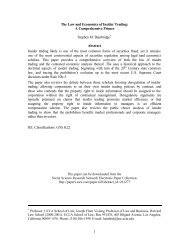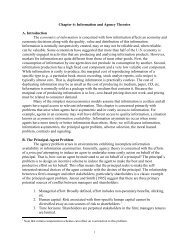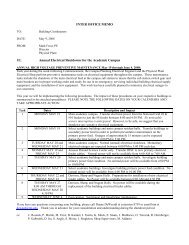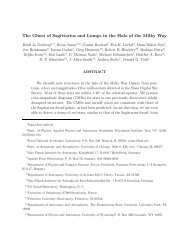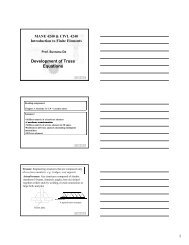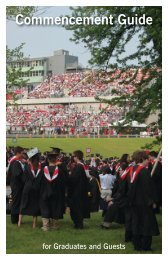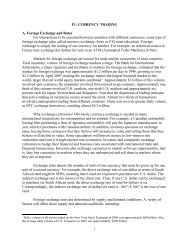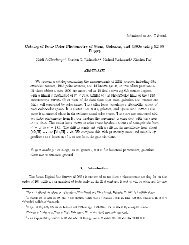Security Brief
Security Brief
Security Brief
You also want an ePaper? Increase the reach of your titles
YUMPU automatically turns print PDFs into web optimized ePapers that Google loves.
UNCLASSIFIED<br />
Counterintelligence Threat to Academic and Scientific Travelers<br />
When you travel overseas in an academic or scientific capacity you are subject to<br />
intelligence collection by foreign intelligence and security services (FISS). FISS are<br />
responsible for identifying individuals who can give them access to people and<br />
information in the US as well as acquiring information that will advance indigenous<br />
research and development. Traveling academic and scientific delegations afford FISS an<br />
ideal opportunity to gather information on US subject matter experts.<br />
• You are known to government institutions before travel because of your visa<br />
• FISS are in a permissive environment when operating in their home country and<br />
can scrutinize you either by design or chance using one of many justifications:<br />
o Fitting a criminal, or other profile<br />
o Participating in “black-market” activity<br />
o Possessing a banned or strictly controlled material<br />
o Associating with persons whom the government views as dissidents<br />
o Having language fluency, declared relatives, or organizational affiliations<br />
in the country you are visiting<br />
FISS intelligence collection operations are usually unobtrusive, non-threatening and<br />
conducted without your knowledge. Although less common, some FISS use more<br />
aggressive or provocative measures meant to intimidate or “test” your reaction.<br />
Intelligence collection methods used by FISS include:<br />
• Elicitation – a ploy whereby FISS use seemingly normal conversation to extract<br />
information about your work and associates<br />
o Elicitation is the most noticeable form of intelligence collection<br />
o It can be difficult to identify and is easy to deny<br />
Examples of Elicitation<br />
Direct questioning Flattery Naiveté<br />
Normal curiosity Word repetition Leading questions<br />
False statements Opposing stand Disputing accuracy<br />
UNCLASSIFIED
UNCLASSIFIED<br />
• Exhaustion—scheduling a lengthy or extensive itinerary of events and activities<br />
designed to tire visitors and make them pliable.<br />
o Drivers or guides frequently accompany visitors and engage in elicitation<br />
• Eavesdropping – listening in on conversations for information<br />
o Usually in social settings (bars, restaurants, or public transportation, etc.)<br />
where talking “shop” often occurs<br />
• Technical Eavesdropping – use of audio/visual devices (often concealed) installed<br />
in public and private facilities, especially hotels and restaurants<br />
• Surreptitious Entry–entry into your hotel room (often hotel assisted),<br />
accommodation or office to access documents or electronic information<br />
• Electronic Interception – Fax, Telex, cell phones, and the internet are vulnerable<br />
to monitoring due to government control of telecom infrastructure<br />
• Physical Surveillance –monitoring of your movements and activities<br />
Common sense and basic CI awareness can effectively protect you against FISS attempts<br />
to collect sensitive information. Things you can do include:<br />
• Do not leave sensitive materials in hotel rooms or safes<br />
• Do not use computers or faxes at hotels or business centers for sensitive material<br />
• Do not discuss information with someone who does not have a reason to know it<br />
• Keep your personal computer as carry-on baggage<br />
• Do not leave cell phones or portable electronics unattended<br />
• Do not attempt to locate listening devices<br />
• Do not attempt to evade physical surveillance<br />
• Report CI incidents when you return<br />
In addition, there are several things you can do to successfully counter elicitation:<br />
• Prepare talking points ahead of time that do not disclose sensitive information<br />
• Do not engage in conversation alone<br />
• Redirect the conversation<br />
• Excuse yourself from the conversation<br />
• Reply to a question with a question<br />
• Provide vague or hypothetical responses<br />
• Provide historical, publicly known information<br />
• Change the topic<br />
• Feign ignorance<br />
• Ask “Why?”<br />
If you observe any activity that seems to be out of character with the purpose of a foreign<br />
visit, please contact the FBI San Diego Field Office at 858-565-1255<br />
UNCLASSIFIED


